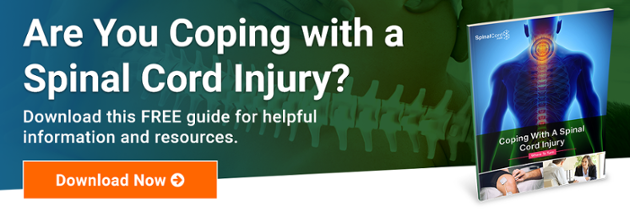Wheelchair Users: What to Do When People Stare

I first began to notice how fascinating I had suddenly become to people during my first trip to the mall after my spinal cord injury (SCI). While before I was a nondescript 14-year-old girl — someone everyone expected to see in the mall — I was suddenly this mysterious person who couldn't walk and it boggled their minds. Everywhere I turned my head, it seemed like I caught someone staring at me.
It really threw me off at first, but now, 24 years later, I've become quite adept at dealing with this behavior when coping with a spinal cord injury. At first, I wanted to find a place on the planet where no one would stare at me — maybe a rehab center — but that’s an impossible search. Why do people stare? People staring at you is because it's human nature to stare at anything different. How we deal with it is all that we can control. (Note: Intentional stares by adults that last at least 10 seconds is the staring behavior I’m talking about.)
And you can take care of these hardcore starers in a handful of ways, including finding a mental state that allows you to deal with them calmly. For tips on how to deal with this #wheelchairlife symptom as cool-headed and effectively as possible, read on for what has worked for me below.
Option 1: Ignore It
More often than not, it’s not worth showing any emotional response to anyone that stares too long. As humans, we need to pick and choose what we expend our energy on. We shouldn’t allow strangers who annoy us to irk us because life is short and feeling anger at something you cannot stop isn't worth your time or energy. The next time you find someone staring at you, consider what else you have going on and your energy levels before reacting.
Option 2: Stare Right Back
If you must do something about the person staring, an easy but very effective move is to stare right back at them. It will usually make them extremely uncomfortable, often causing them to look away. By my estimations, it's a slam-dunk success about 95% of the time. When the other really rude 5% keep staring (I have been in staring matches before), it's best just to wave and move on. You always can approach them, but I’ve saved advice for that chessboard move below.
Option 3: Laugh and Smile
Some people won't even realize they're staring at you. When you encounter this type of person when out and about, a great way to let them know their behavior is inappropriate is to laugh and maybe roll your eyes a little bit. This condescending gesture will give them the hint that their staring games are highly inappropriate and is being construed as rude. Again, they might not care, and this is when saying something may be appropriate.
Option 4: Have a Quick-Witted Response at the Ready
When approaching a rude, staring person, you’ll always want an armory of quick-witted responses to smoothly respond to their non-verbal assault. A perennial favorite among wheelchair users is, “Take a picture. It’ll last longer,” but there are other funny things you can say as well. One of my personal favorites is, “Can I help you?” It’s simple, but often times it’ll really catch them off-guard. Other funny things to say to anyone staring is, “Yup. It’s a wheelchair,” “I’m not disabled, I’m just lazy,” or “Do I know you?”
Option 5: Take a Photo
If you want to get really dirty, you can always take a picture of them. This guarantees they will look the other way because no one wants to be shamed online, which is hopefully what they will assume you'll be doing with the photo (and you should, by the way, if they really are deserving of it).
Remember, there are honest stares — stares out of pure curiosity — and then there are the stares that cross the line from adults (not kids), and go into gawk-mode. These are the types of stares that we need to deal with together as a community.
Conversely, it is important for people who find themselves staring at someone who is differently-abled and don’t know how to react to learn to respond. Here are some great tips from a blog that I’ve come across.
What is your preferred way to handle stares?
Stay Updated on Advancements On Traumatic Brain &
Spinal Cord Injuries
About the Author





